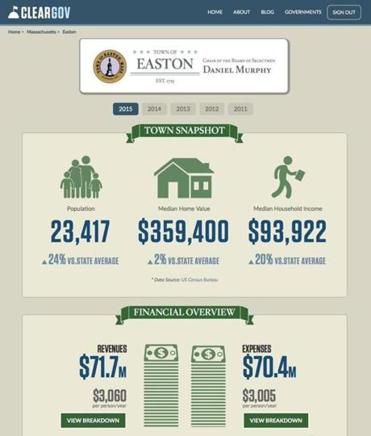From: http://www.bostonglobe.com/
Earlier this year, Hopkinton resident Chris Bullock was deciding how to vote on a tax increase that would fund a new school. He wanted to know how much the town spent on education, and how that compared to other nearby towns — reasonable questions that any engaged voter might ask.
But the information was surprisingly hard to find. Charts buried in the town’s 230-page annual report were inscrutable, the money scattered across various funds labeled with jargon. Even after piecing together a few figures, Bullock had no way to make sense of them. Was his town spending a lot or only a little on education?
That frustrating exercise was the genesis of ClearGov , a startup founded by Bullock that takes towns’ raw financial data and turns them into visually appealing online infographics, along with comparisons to similar towns nearby.
For residents, Bullock said, ClearGov aims to make local governments more approachable, transparent, and accountable.
And for officials, the software should help them parse voluminous budget spreadsheets to better compare their finances to those of nearby towns.
e site also encourages officials to answer questions posted on the site by residents and annotate their numbers with plain-English explanations of the policies behind them.
“This is basically giving town officials performance metrics, so you can measure the outcomes of policies,” Bullock said. “It provides a lot of intelligence for the policy makers.”
The ClearGov site is active in Massachusetts, New York, and California, but Bullock is courting investors and hopes to expand to other states soon. So far, he has funded the company himself and employs four part-timers. Prices for municipalities range from $995 to $50,000 annually, depending on population.
This week, ClearGov is launching its new “premier” product, which lets towns pay to add additional historic and forward-looking data, more detailed drill-downs, and analysis of each taxpayer’s share of the town budget.
Easton is one of five Massachusetts municipalities — along with Athol, Northfield, Oxford, and Warwick — to sign up for new paid service, inking a $1,500 deal with ClearGov in September that runs through June 2016, according to town officials.
The town’s ClearGov page gives a snapshot of its population and median home values and incomes, plus graphs of Easton’s debt load and rainy day reserve fund. There’s also a detailed, per-capita breakdown of where Easton’s revenues come from: In 2015, the town took in around $53.6 million in taxes, or $2,290 per resident annually; state aid to the town totaled about $12.9 million, or $551 for each resident.
Alongside the data, which ClearGov extracts from filings with the state, Easton’s assistant town administrator, Connor Read, has added short commentaries. Explaining a jump in the town’s “charges for services” revenue, for example, Read wrote, “the increasing collections in this category reflect the addition of a second ambulance to our Fire Department, resulting in greater numbers of local ambulance transports.” It’s this kind of contextual detail that Bullock was frustrated to find missing in his own town’s reports.
Easton officials lauded the technology.
“Even though the town puts out lots and lots of information, it’s in a format that’s hard for people to understand and digest,” said Dottie Fulginiti, an Easton selectwoman. “By making it visual like this, it brings us a lot closer to the residents.”
Fulginiti said ClearGov’s per-capita calculations would help residents understand what they are buying with their tax dollars.
“When you look at your property tax bill, you don’t know how much goes to the police or the schools,” she said. “Knowing your own share helps you understand a lot.”
Fulginiti said she didn’t expect the site to become a political tool for incumbents, who might put a positive spin on bad numbers or ask ClearGov to withhold unflattering information.
“I don’t really think people would take the time to mastermind something like that,” she said. “We don’t want this to be a political forum; we want it to be an informational forum.”








Leave a Reply
You must be logged in to post a comment.